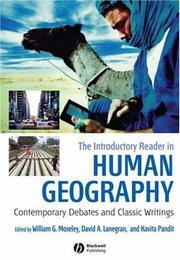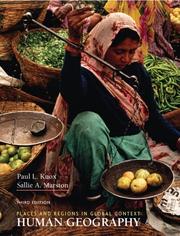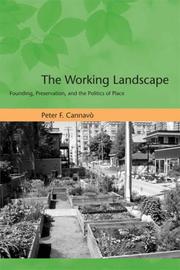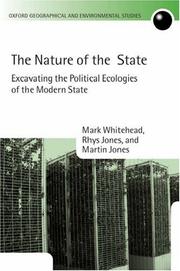| Listing 1 - 10 of 15 | << page >> |
Sort by
|

ISBN: 9781405149211 9781405149228 Year: 2007 Publisher: Malden, MA : Blackwell Pub.,
Abstract | Keywords | Export | Availability | Bookmark
 Loading...
Loading...Choose an application
- Reference Manager
- EndNote
- RefWorks (Direct export to RefWorks)
Human geography. --- Géographie humaine --- Geografie --- Sociale geografie --- Algemene Werken. --- Géographie humaine
Book
ISBN: 9782729830168 2729830162 Year: 2007 Publisher: Paris : Ellipses,
Abstract | Keywords | Export | Availability | Bookmark
 Loading...
Loading...Choose an application
- Reference Manager
- EndNote
- RefWorks (Direct export to RefWorks)
Globalization. --- Economic geography. --- Human geography. --- Mondialisation --- Géographie économique --- Géographie humaine
Book
Abstract | Keywords | Export | Availability | Bookmark
 Loading...
Loading...Choose an application
- Reference Manager
- EndNote
- RefWorks (Direct export to RefWorks)
Human geography --- Regional planning --- Géographie humaine --- Aménagement du territoire
Book
ISBN: 9782880747091 Year: 2007 Publisher: Lausanne : EPFL,
Abstract | Keywords | Export | Availability | Bookmark
 Loading...
Loading...Choose an application
- Reference Manager
- EndNote
- RefWorks (Direct export to RefWorks)
Geography. --- Human geography. --- Géographie --- Géographie humaine --- Santos, Mílton.

ISBN: 0131497057 9780131497054 Year: 2007 Publisher: Upper Saddle River Pearson Prentice Hall
Abstract | Keywords | Export | Availability | Bookmark
 Loading...
Loading...Choose an application
- Reference Manager
- EndNote
- RefWorks (Direct export to RefWorks)
Human geography. --- Geografie --- Sociale geografie --- Algemene Werken. --- Human geography --- Anthropo-geography --- Anthropogeography --- Geographical distribution of humans --- Social geography --- Anthropology --- Geography --- Human ecology --- Géographie humaine
Book
ISBN: 9782020937955 2020937956 Year: 2007 Publisher: Paris : Seuil,
Abstract | Keywords | Export | Availability | Bookmark
 Loading...
Loading...Choose an application
- Reference Manager
- EndNote
- RefWorks (Direct export to RefWorks)
Spatial behavior --- Human geography --- Comportement spatial --- Géographie humaine --- Social Geography --- Human Space --- Espace (architecture) --- Espace (philosophie) --- Sémiotique et urbanisme --- Territorialité humaine --- Géographie urbaine --- Anthropologie --- Géographie humaine --- Territorialité humaine. --- Sémiotique et urbanisme. --- Géographie humaine. --- Géographie urbaine. --- Anthropologie. --- Sémiotique et urbanisme --- Territorialité humaine --- Géographie humaine. --- Géographie urbaine
Book
ISBN: 9782746710238 2746710234 Year: 2007 Publisher: Paris : Autrement,
Abstract | Keywords | Export | Availability | Bookmark
 Loading...
Loading...Choose an application
- Reference Manager
- EndNote
- RefWorks (Direct export to RefWorks)
Human geography --- Muslims --- Géographie humaine --- Musulmans --- Tatarstan (Russia) --- Russia (Federation) --- Tatarie (Russie) --- Russie --- Politics and government --- Ethnic relations --- Politique et gouvernement --- Relations interethniques --- MusulmansTatarstan (Russia) --- RussiePolitics and government --- Géographie humaine

ISBN: 026203364X 9786612098840 1282098845 0262269805 1429484055 9780262269803 9781429484053 9780262033640 9780262532921 0262532921 9781282098848 6612098848 Year: 2007 Publisher: Cambridge, Mass. MIT Press
Abstract | Keywords | Export | Availability | Bookmark
 Loading...
Loading...Choose an application
- Reference Manager
- EndNote
- RefWorks (Direct export to RefWorks)
In America today we see rampant development, unsustainable resource exploitation, and commodification ruin both natural and built landscapes, disconnecting us from our surroundings and threatening our fundamental sense of place. Meanwhile, preservationists often respond with a counterproductive stance that rejects virtually any change in the landscape. In The Working Landscape, Peter Cannavo identifies this zero-sum conflict between development and preservation as a major factor behind our contemporary crisis of place. Cannavo offers practical and theoretical alternatives to this deadlocked, polarized politics of place by proposing an approach that embraces both change and stability and unifies democratic and ecological values, creating a "working landscape."Place, Cannavo argues, is not just an object but an essential human practice that involves the physical and conceptual organization of our surroundings into a coherent, enduring landscape. This practice must balance development (which he calls "founding") and preservation. Three case studies illustrate the polarizing development-preservation conflict: the debate over the logging of old-growth forests in the Pacific Northwest; the problem of urban sprawl; and the redevelopment of the former site of the World Trade Center in New York City. Cannavo suggests that regional, democratic governance is the best framework for integrating development and preservation, and he presents specific policy recommendations that aim to create a "working landscape" in rural, suburban, and urban areas. A postscript on the mass exile, displacement, and homelessness caused by Hurricane Katrina considers the implications of future climate change for the practice of place.
Land use --- Sustainable development --- Human geography --- Political ecology --- Regional planning --- Real Estate, Housing & Land Use --- Business & Economics --- Government policy --- Citizen participation --- Citizen participation. --- Regional development --- State planning --- Human settlements --- Planning --- City planning --- Landscape protection --- Social ecology --- Green movement --- ENVIRONMENT/Environmental Politics & Policy --- SOCIAL SCIENCES/Political Science/Political & Social Theory --- Utilisation du sol --- Développement durable --- Géographie humaine --- Ecologie politique --- Aménagement du territoire --- Politique gouvernementale --- Participation des citoyens

ISBN: 0191917605 128116447X 9786611164478 0191515132 1429470755 9780191515132 9781281164476 6611164472 9781429470759 0199271895 9780199271894 9780191917608 Year: 2007 Publisher: Oxford : Oxford University Press,
Abstract | Keywords | Export | Availability | Bookmark
 Loading...
Loading...Choose an application
- Reference Manager
- EndNote
- RefWorks (Direct export to RefWorks)
'The Nature of the State' challenges the ways in which social scientists and geographers approach the study of state-nature relations. Introducing original research into the different institutional and temporal strategies used by states to frame the natural world, this book provides an overview of political and ecological theories.
Human geography --- Human ecology --- Political geography. --- Political ecology. --- Environmental policy --- Ecology --- Environment, Human --- Human beings --- Human environment --- Ecological engineering --- Nature --- Anthropo-geography --- Anthropogeography --- Geographical distribution of humans --- Social geography --- Anthropology --- Geography --- Environment and state --- Environmental control --- Environmental management --- Environmental protection --- Environmental quality --- State and environment --- Environmental auditing --- Social ecology --- Green movement --- Geography, Political --- Political aspects. --- Social aspects --- Effect of environment on --- Effect of human beings on --- Government policy --- Géographie humaine --- Ecologie humaine --- Géographie politique --- Ecologie politique --- Environnement --- Politique gouvernementale
Book
ISBN: 9780745612355 9780745612362 9780745677743 9780745667751 0745612369 Year: 2007 Publisher: Cambridge Polity Press
Abstract | Keywords | Export | Availability | Bookmark
 Loading...
Loading...Choose an application
- Reference Manager
- EndNote
- RefWorks (Direct export to RefWorks)
This new book brings together Doreen Massey's key writings on three areas central to a range of disciplines. In addition, the author reflects on the development of these ideas and outlines her current position on these important issues. The book is organized around the three themes of space, place and gender. It traces the development of ideas about the social nature of space and place and the relation of both to issues of gender and debates within feminism. It is debates in these areas which have been crucial in bringing geography to the centre of social sciences thinking in recent years, and this book includes writings that have been fundamental to that process. Beginning with the economy and social structures of production, it develops a wider notion of spatiality as the product of intersecting social relations. In turn this has lead to conceptions of a placea as essentially open and hybrid, always provisional and contested. These themes intersect with much current thinking about identity within both feminism and cultural studies. Each of the themes is preceded by a section which reflects on the development of ideas and sets out the context of their production. The introduction assesses the current state of play and argues for the close relationship of new thinking on each of these themes. This book will be of interest to students in geography, social theory, women studies and cultural studies.
Sociology of the family. Sociology of sexuality --- Architecture and women --- Feminism and architecture --- Feminist theory --- Human geography --- Personal space --- Sex role. --- Gender identity. --- Social interaction --- Space and time --- Spatial behavior --- Architecture et femmes --- Féminisme et architecture --- Théorie féministe --- Géographie humaine --- Espace personnel --- Rôle selon le sexe --- Identité sexuelle --- Interaction sociale --- Espace et temps --- Comportement spatial --- Sociology of environment --- Environmental planning --- gender
| Listing 1 - 10 of 15 | << page >> |
Sort by
|

 Search
Search Feedback
Feedback About UniCat
About UniCat  Help
Help News
News